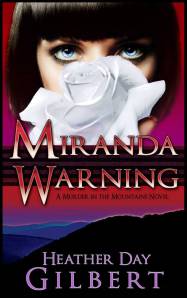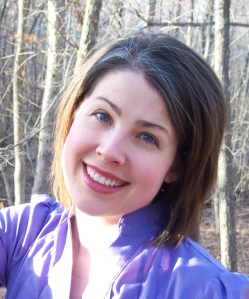by Heather Day Gilbert, @heatherdgilbert 
Many people wonder why my second book is a contemporary Appalachian mystery (Miranda Warning), when my debut novel was a Viking historical (God’s Daughter). Although both books are starts to a series, (A Murder in the Mountains and Vikings of the New World Saga, respectively), I realize there is quite a disparity between the two genres.
When I decided to publish my mystery before the second Viking novel, it flew in the face of the advice of many successful indie authors. You’re supposed to pick a genre and stick with it long enough to build a following for that series. My Viking historical was doing well and I knew readers were anxious for book two in that series.
However, I knew it would take at least a year to write/produce my next historical, and my mystery was ready to go. It had been line edited and was still out on submission with three publishers. When my agent contract came up for renewal, I realized I didn’t want to sit around waiting anymore. It was time to leave my agent, become a full-time indie author, and get my mystery out.
When I launched my mystery, I quickly found mystery readers (especially contemporary mystery readers) tend to be a different crew than historical readers. But I also found that if readers like an author’s voice, they will often follow you across genres. At this point, I think my readers are pretty evenly split between those who love my historical best and those who love my mystery best. I’m thankful for this, because it means I can pursue both series without worrying too much about losing readers.
As far as writing techniques for the two genres, mystery-writing is a whole different animal than historical-writing. My historicals take hours of research. I check into Old Norse words and try to utilize the ones they had back then. I also try to weave the storyline in with the sagas’ storylines, making a kind of cohesive whole. All this sometimes makes for slower, stop-and-go writing.
My mysteries are different. Since they are contemporary and set in my home state, West Virginia, I don’t have to spend as much time on research. I can use a wider vocabulary than I do in my historicals.
I loosely plot my mysteries based on chapters, since my chapters tend to be short scenes. I like to know which chapters will require key players to be in dangerous situations, for example. Since my mysteries are like cozies, where small-town family/friends play a key role the drama, I intersperse family action with mystery action. I want readers to feel invested in the characters themselves, a la the Karon Mitford series.
For Miranda Warning, I actually wasn’t sure whodunit until partway through the book. As I got to know the characters more, I realized who was lying and who was deceived. I love it when my characters surprise me. I don’t know if this will be the case with all my mysteries, but it just worked out with this one. Yes, I do weave in clues for my readers, and yet I like my mysteries to be more psychological than clue-based…more like Rebecca by du Maurier, where you start to unlock the key to the mystery by understanding the characters’ motivations.
People often ask me if I prefer historical writing or mystery writing. The answer often depends on my mood. I’m passionate about the Viking era, and it’s one period of history I don’t think I’ll ever get tired of reading about. And yet my contemporary mysteries are just a joy to write. I love injecting humor into my books, and it’s trickier to do with a limited vocabulary in a land where people are often fighting for survival.
The next book in my writer queue is my second (and final) Viking historical, Forest Child. When that is out (hopefully in 2015), I will be free to focus on my mystery series, which will probably continue for many books. The second in that series will be titled Trial by Twelve, and I’m looking forward to writing it.
The wonderful thing about being an indie author is that I can take chances and get my books out to readers when the books are ready, regardless of genre. Whether I’m known as a historical author or a mystery author doesn’t matter one bit to me, and that’s why I haven’t struggled too hard to brand myself. My author name is my brand. Readers will find that my writer voice is the same, no matter what century I’m writing in.
HEATHER DAY GILBERT enjoys writing stories about authentic, believable marriages. Seventeen years of marriage to her sweet Yankee husband have given her some perspective, as well as eleven years spent homeschooling. Heather regularly posts on Novel Rocket about self-publishing.
You can find Heather at her website, Heather Day Gilbert–Author, and at her Facebook Author Page, as well as Twitter, Pinterest, YouTube, and Goodreads. Her Viking novel, God’s Daughter, is an Amazon bestseller. You can find it on Amazon and Audible.com. Her Appalachian mystery, Miranda Warning, released June 20th and you can find it here.
A randomly selected commenter will receive a free copy of Heather’s new release, Miranda Warning.

Hi Elizabeth – good to read Heather’s approach to her two genres … having just been to the Viking Exhibition at the British Museum and heard a lecture on the language – and our (Britain’s) interaction with it … it is a fascinating era. The historical novels sound really interesting … while then continuing on with the murder mystery series sounds eminently sensible …
You can’t get bored that way either .. good luck – and good luck to you both with your various novels … cheers Hilary
I mainly read (and write) mystery/crime, but this interview with Heather rekindles my love of the Vikings and the Icelandic Sagas. So started following her website and added “God’s Daughter” to my MUST read list. Also good to know how switching between genres works – I also write shorts in SF/fantasy genre. Thanks Elizabeth for sharing this.
Writing in two different genres sounds like it would satisfy all urges. If you do them both well, then keep writing.
Elizabeth – Thanks for hosting Heather.
Heather – Thanks for sharing what it’s like to write in two different genres. It sounds as though it gives you both flexibility and creative ‘push’ as well. I wish you success.
I write in several genres and it should be about branding your name.
Thank you so much for your encouraging comments! Roland, yes, if you’ve read the Saga of Greenlanders or Eirik the Red’s Saga lately, you’ll see how I truly structured this novel closely around the storyline. I love it when saga-readers get hold of my book!
And I appreciate the idea of name branding, L. Diane. I’ve tried to come up with taglines that tie all my books together, but right now I do feel most comfortable just having my name represent my books rather than a tagline/catchphrase. Maybe once the mystery series is rolling with more books, I’ll focus more on that. But my historicals will always be something that represent me as an author, as well!
Glad to have found you, Heather. Must be decades since I read the Sagas, but it is time to re-visit them or at least your re-mediation. However, been researching seidr and volvas for a series of shorts partly set in Norway.
When an author has a good writing voice, it really doesn’t matter what genre they write in. I enjoy authors that write in different genres because it gives me a change of pace for my reading, but I still get to enjoy an author’s work I like. Both your series sound intriguing. Wishing you much success, Heather.
I have written a couple of different genres as well. I find the readership is different as you have found and that they are both different to research. Excellent article. I hope your books do well.
People aren’t normally about one thing. We might read more than one genres, so it stands to reason that we might various genres.
I agree–we all have genres we migrate to, so it makes sense we stretch our author wings and try different ones. Personally, I do love both, though the mysteries are far less time-consuming. Thanks for commenting today!
Its great to meet Heather! I can relate to writing about a setting from your home state. It does not require the research another type of setting would. I’m writing a similar story set in my home state of Michigan and its going so much faster than anything else I’ve written.
Best wishes for Miranda Warning!
Thanks, Stephen! I do have to do some research as it’s set in another part of my state…but nothing near what I have to do writing historicals! All the best as you write yours set in your home state. I love getting to know about different locales via fiction!